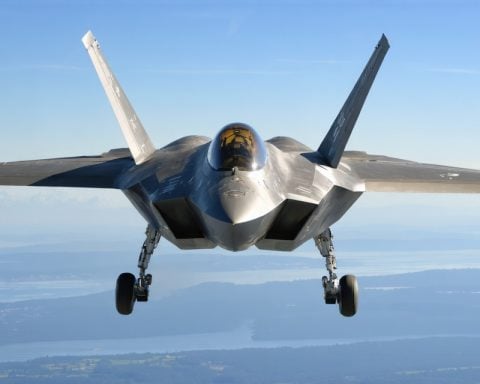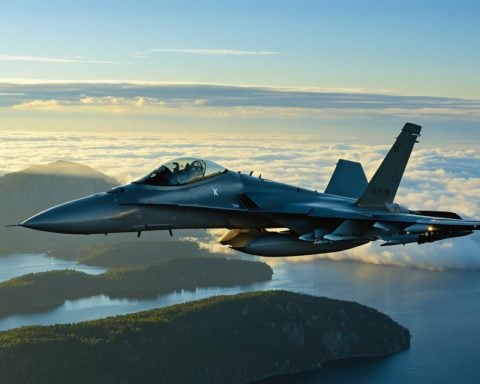In a powerful demonstration of military readiness, NATO recently orchestrated the Ramstein Flag exercise, which involved over 130 aircraft soaring through the skies of Greece. This multi-national drill, featuring fighter jets and support planes from a dozen NATO countries, aimed to sharpen combat capabilities and enhance teamwork among the alliance members.
The event underscored NATO’s ongoing commitment to ensuring security and stability in the Euro-Atlantic region amidst evolving global threats. Participating nations included the United States, the United Kingdom, France, and others, each contributing to the large-scale aerial operation. Vital assets in this exercise were NATO’s Airborne Warning and Control System (AWACS) and RQ-4D drones, crucial for overseeing command and operational effectiveness.
A Hellenic Air Force representative, Colonel Alexandros Chalkopoulos, highlighted the significance of this collaboration. The exercise fostered strong ties among allied pilots, while navigating complex combat scenarios, thereby reinforcing the importance of coordinated defense strategies across borders.
Conducted from September 30 to October 11, 2024, this inaugural iteration of the Ramstein Flag series was not just a training exercise, but a crucial aspect of NATO’s “Deter and Defend” strategy. Advanced aircraft, including F-35s and Eurofighters, took to the skies, showcasing NATO’s capacity to conduct integrated air operations.
Ultimately, this drill exemplified NATO’s readiness and collective strength, poised to respond to potential crises while safeguarding peace in Europe.
The Ramstein Flag Exercise: Impact on Lives, Communities, and National Security
The recent Ramstein Flag exercise conducted by NATO in Greece is more than a display of military strength; it has significant implications for the lives of individuals, communities, and entire nations. As geopolitical tensions rise and security concerns become more pronounced, understanding the effects of such multinational military drills is essential.
The Ramstein Flag exercise took place from September 30 to October 11, 2024, involving over 130 aircraft from various NATO member countries. This robust demonstration of military readiness raises various questions about its impact on local populations, national policies, and international relations.
1. Local Community Engagement and Safety Concerns
While the military maneuvering showcases international cooperation, it also affects local communities in host countries like Greece. Residents often experience heightened noise levels and increased military presence during such exercises. In regions near airbases, this can lead to concerns about safety, disruptions, and environmental impacts. Although many locals understand the necessity of military readiness, there can be controversies surrounding the balance between national security and community well-being.
2. Strengthening Alliances and Security Assurance
The Ramstein Flag exercise was not solely a training initiative but also a commitment to collective security in the Euro-Atlantic region. The participation of countries such as the United States, the United Kingdom, and France signals a unified stance against potential threats. For many nations involved, this exercise represents an assurance of support from allies, which can enhance national security perceptions. This sentiment can pivotally affect public opinion regarding military spending and defense policies.
3. Economic Implications for Host Countries
Hosting NATO exercises can also yield economic benefits for countries. Increased military activity often translates into elevated spending in local economies, from hotels and restaurants catering to soldiers to the logistics of transporting military equipment. Conversely, regions that feel the strain from these exercises may call for economic compensation or alternative strategies to mitigate adverse effects.
4. Ethical Considerations and Public Opinion
The ethical responsibilities involved in military exercises are continually debated. Critics argue that the focus on military readiness can detract from addressing socio-economic issues or provoke tensions with nations outside the alliance. Moreover, public opinion can be split; while some citizens may support a strong military presence as a deterrent, others worry about possible escalations of conflicts or the implications of an aggressive foreign policy.
5. Technological Advancements and Military Innovation
Advanced aircraft showcased during the Ramstein exercise, such as F-35s and Eurofighters, highlight ongoing developments in military technology. The integration of drones and sophisticated command systems demonstrates a shift in modern warfare strategies. This could potentially influence defense industry investments, job creation in tech sectors, and overall military capabilities of participating countries.
In conclusion, the Ramstein Flag exercise is a multifaceted event that extends beyond military training drills. Its implications touch the lives of individuals, influence community sentiments, bolster national security, and shape international relations. As nations navigate the complexities of modern defense strategies, discussions surrounding such military exercises will remain crucial in addressing safety, ethical concerns, and community impacts.
For more information on NATO’s initiatives and exercises, visit NATO.
The article has been updated: 2024-11-03 01:16
Here are some suggested related links:
1. NATO Official Site – The official website of NATO provides comprehensive information about the organization’s missions, latest news, and initiatives, including exercises like the Ramstein Flag Exercise.
2. U.S. Department of Defense – The DOD’s official site offers news and resources related to military operations and alliances, including details about NATO’s collaborative exercises and security initiatives.
3. Army Times – A news outlet focused on military affairs, where you can find articles related to NATO exercises, military strategy, and defense news.
4. Euractiv – A media network specializing in EU-related news that covers topics relevant to NATO alliances and defense strategy in Europe.
5. Jane’s Defence – A leading source of defense and security intelligence that provides insights into NATO exercises, military capabilities, and strategic alliances.
The article has been updated: 2024-11-06 01:10
What are the key objectives of NATO’s Ramstein Flag Exercise in strengthening alliances?
The key objectives of NATO’s Ramstein Flag Exercise include enhancing interoperability among NATO forces, improving tactical and strategic coordination among member nations, and demonstrating the alliance’s collective defense capabilities. The exercise aims to simulate realistic combat scenarios to prepare forces for potential challenges, strengthen relationships between allied military units, and ensure that all participating countries can operate seamlessly together. This contributes to the overall readiness and deterrence posture of NATO, reinforcing the commitment to mutual defense among its member states.







